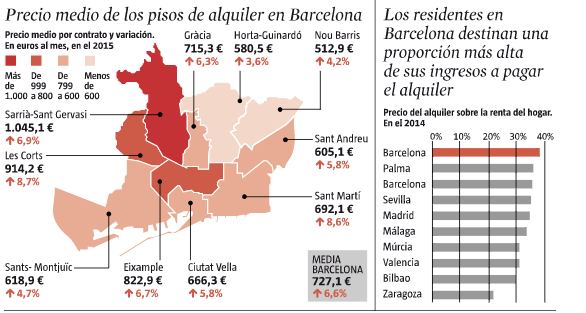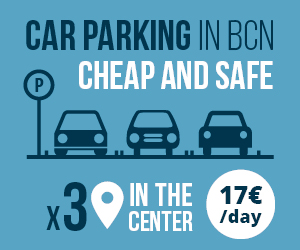Mayor Colau asks the State and Government to amend the legislation on urban rent!
Barcelona tops the list of major cities in Spain where families spend a higher proportion of their income, about 40 %, to pay their rent, according to a study presented yesterday by Mayor Ada Colau. Because of this and because of the 6,6% increase in the lease price recorded last year (compared to 2014) also being the highest in Spain, Colau called for the State and the Government to establish the necessary measures to limit the rise in rental prices.
The mayor alerted to “the danger of a new real estate bubble” and urges the Government and the State to begin a process of modifying the legislation on urban leases. Colau spoke of the case of Germany, where the government enables a consensus in price between the landlord and the tenant if they detect that the rent is above what those earning average wages can pay. Additionally, both in Barcelona, as in the whole of Spain, the level of social housing only accounts for 2% of total rental housing. In Amsterdam this percentage is 48%, in Berlin 30.23% and 17.2%in Paris.

One of the challenges Calau will face in assuming the current mandate is to expand social housing. One of the ways to do this is by releasing empty homes owned by financial institutions and investment funds. In December, SAREB bank and the City Council agreed to the transposal for a period of eight years of 200 flats to families without resources, and yesterday Colau announced 50 more by CaixaBank. To these must be added the purchase of 131 apartments below market price to different entities, 28 as a result of exercising the right of first refusal, and 48 in process of being acquired by this same procedure.
“Since the beginning of the mandate we have added 455 homes to social housing. It is not enough, but the previous government only managed to add 33,” stressed Colau, who protested against the BBVA´s lack of cooperation in this project. As indicated, this bank has 633 empty flats in Barcelona to which must be added the 418 acquired with the purchase of Catalunya Caixa.
The City Council will have to face the question of how to resolve illegal occupation of social housing apartments, some of which come from transfers from banks. Housing Councillor, Josep Maria Montaner, said that the situation of occupant families will be regularized depending on their vulnerability and time they have spent in the residence in question, at the beginning a minimum of two years .
In privately owned homes, the problem is greater: in only four districts (Ciutat Vella, Nou Barris, Sant Andreu and Sant Martí) 1,200 occupations have been detected. A percentage that has not been possible to clarify is the case of apartments in which organized groups have broken in, changed the lock and have charge people between 2,000 and 3,000 euros as a right of entry, plus a monthly fee. These groups take advantage of the situation of insecurity in many families, mostly immigrants.
Source: Rosa M. Bosch (La Vanguardia)
Photo Credit: Ayuntamiento de Barcelona
Featured Photo Credit: santivives.com





























































































